order histories, retained contact details for faster checkout, review submissions, and special promotions.
Forgot password?
order histories, retained contact details for faster checkout, review submissions, and special promotions.
Location
Corporate Headquarters
Vector Laboratories, Inc.
6737 Mowry Ave
Newark, CA 94560
United States
Telephone Numbers
Customer Service: (800) 227-6666 / (650) 697-3600
Contact Us
Additional Contact Details
order histories, retained contact details for faster checkout, review submissions, and special promotions.
Forgot password?
order histories, retained contact details for faster checkout, review submissions, and special promotions.
ATP6V1G3
ATPase, H+ transporting, lysosomal 13kDa, V1 subunit G3
ATP6V1G3 is a component of vacuolar ATPase (V-ATPase), a multisubunit enzyme that mediates acidification of eukaryotic intracellular organelles. V-ATPase dependent organelle acidification is necessary for such intracellular processes as protein sorting, zymogen activation, receptor-mediated endocytosis, and synaptic vesicle proton gradient generation. V-ATPase is composed of a cytosolic V1 domain and a transmembrane V0 domain. The V1 domain consists of three A and three B subunits, two G subunits plus the C, D, E, F, and H subunits. The V1 domain contains the ATP catalytic site. The V0 domain consists of five different subunits: a, c, c', c' and d. Additional isoforms of many of the V1 and V0 subunit proteins are encoded by multiple genes or alternatively spliced transcript variants. This gene encodes one of three G subunit proteins. Transcript variants encoding different isoforms have been found for this gene.
| Gene Name: | ATPase, H+ transporting, lysosomal 13kDa, V1 subunit G3 |
| Family/Subfamily: | Transporter , ATPase - V type |
| Synonyms: | ATP6V1G3, ATP6G3, V-ATPase G subunit 3, Vma10, V-ATPase 13 kDa subunit 3, V-ATPase G3 subunit, V-ATPase subunit G 3 |
| Target Sequences: | NM_133262 NP_573569.1 Q96LB4 |
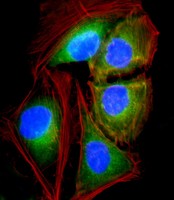
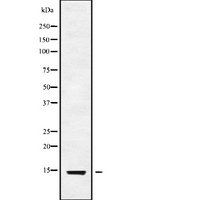
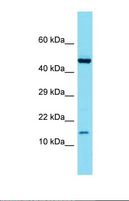



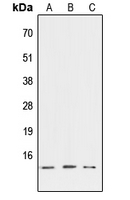

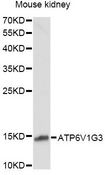


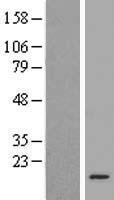
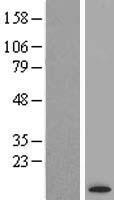
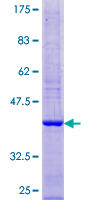

If you do not find the reagent or information you require, please contact Customer.Support@LSBio.com to inquire about additional products in development.










